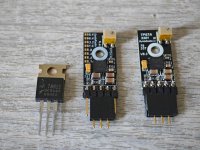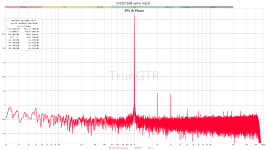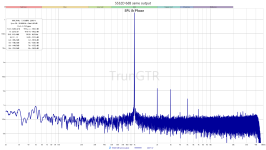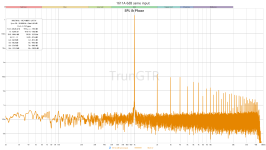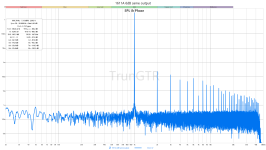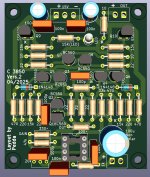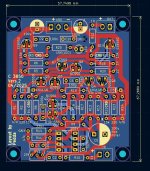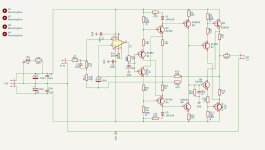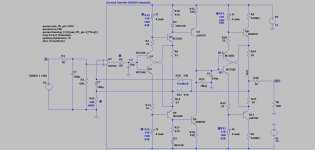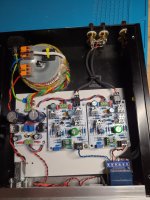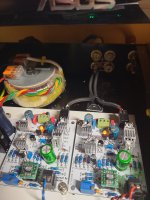Hi
i would wait for the less gain setting end then look at the graphs. But it is not always the THD measurements that makes music sound good or not so good. e.g. relation H3 Vs H2.
kr
chris
i would wait for the less gain setting end then look at the graphs. But it is not always the THD measurements that makes music sound good or not so good. e.g. relation H3 Vs H2.
kr
chris
nope...but i wrote at the beginning these would be "high end" 😉 .
if the chips are real
kr
chris
if the chips are real
kr
chris
I bought the same clone C3850. But when I get close to the speakers I hear a noise that is not there if the preamplifier is not turned on. I am planning a major upgrade of this preamplifier, which exceeds its price. I hope it will have a positive effect on the sound. For now I have removed the voltage switching board for 115-230 V. I replaced the power connector with Furutech Rhodium and the connecting cables for 230 V with solid core Furutech. It had a positive effect. Naturally I changed the op amp to LC6. I have a Burson V6 Vivid available. I plan to replace the diode rectifier, LM317, 337 with a Sparkos Discrete Voltage Regulator. I will replace the capacitors, relays, ALPS pot, internal wiring and eventually the RCA jacks.
I guess there will be a big difference in sound, in a positive sense.
I guess there will be a big difference in sound, in a positive sense.
I reduced the gain to 6dB with a 470R resistor. Here are the measurements. The overall seems to be the same, just a slightly lower harmonic level.
Attachments
Hi,
i had to to make little changes. I have to test my pcb in the next days. I had choosed the wrong footprint for the opa, but could find a solution...
On the pcb you can build the original C3850 clone of course, but i had choosed to take the changes Chalky had simulated. All changes to make are marked on the pcb.
I to put a pot in to adjust the offset of a AD797. If it is not the OPA you want, spare the footprint/pot out. An other single OPA will work too...if my pcb will work...🙂
Instead of BC560/550 i use BC550/557. This transistors are better for matching. As Chalky simulated i use S8050/8550, two pairs on each pcb, too.
I have matched the the crd diodes to 0,67 Voltage drop over the crd, using a 82k resistor. Not easy, because i had bought 25 pieces and found exact 8 similar diodes.
For transistor matching ordered 200 pieces from each BC type. Stupid work...
I only can hope, that the effort was worth it...
If the pcb is fine and the preamp works, i will share my gerber files.
Greets
Peter
i had to to make little changes. I have to test my pcb in the next days. I had choosed the wrong footprint for the opa, but could find a solution...
On the pcb you can build the original C3850 clone of course, but i had choosed to take the changes Chalky had simulated. All changes to make are marked on the pcb.
I to put a pot in to adjust the offset of a AD797. If it is not the OPA you want, spare the footprint/pot out. An other single OPA will work too...if my pcb will work...🙂
Instead of BC560/550 i use BC550/557. This transistors are better for matching. As Chalky simulated i use S8050/8550, two pairs on each pcb, too.
I have matched the the crd diodes to 0,67 Voltage drop over the crd, using a 82k resistor. Not easy, because i had bought 25 pieces and found exact 8 similar diodes.
For transistor matching ordered 200 pieces from each BC type. Stupid work...
I only can hope, that the effort was worth it...
If the pcb is fine and the preamp works, i will share my gerber files.
Greets
Peter
Attachments
Hi....
i have to say WOW...😊
Today i test my mono pcb's, first with OPA827. But I had the feeling it distorted a little...mhmmm
Took the OPA827 out and AD797 ANZ in...what a difference. The gain is now set with a 330 ohm resistor, i think it is a little too much. I will try 470 ohm.
No hiss and no hum in my speakers anymore, very fine...👍The sound is very good to my ears. Unusual, i have not expected that...
The Offset of the AD797 has a little drift of 0,04 mv, perhaps a cap is missing, dont know. The offset on the output is 7 mV. I am finding a bit to high. The Original Mofi Clone had 5mV, but not working with this higher current. It was not easy to find 100% matched BC557/BC550 pairs. there always was a little difference of 0,10 mV Vbe.
If you have a look to the picture you can see little heatsinks on four transistors. They are necessary. The heatsinks i find a little to small. I have given the S8050/8550 transistors more space on the pcb to use other, bigger ones.
The supply is based on my layout, using LM337/317. The first caps are 2200µf caps, the second 220 uf and 1uf tantal. 100nf Wimas for input and output...
I decide to make a supply pcb with TL431. Must be a little better.
As i promised, i share the gerber file. The C3850 "Mono" is based on the simulation Chalky had made...thank you very much.
The CRD diodes are marked on the pcb, "K" for Kathode. Gain and OPA output is also marked.
For adjusting you need a 20k pot, because of using +-15 volts. Measure between the two testpoints at the pot.
Best wishes
Peter
🙂
i have to say WOW...😊
Today i test my mono pcb's, first with OPA827. But I had the feeling it distorted a little...mhmmm
Took the OPA827 out and AD797 ANZ in...what a difference. The gain is now set with a 330 ohm resistor, i think it is a little too much. I will try 470 ohm.
No hiss and no hum in my speakers anymore, very fine...👍The sound is very good to my ears. Unusual, i have not expected that...
The Offset of the AD797 has a little drift of 0,04 mv, perhaps a cap is missing, dont know. The offset on the output is 7 mV. I am finding a bit to high. The Original Mofi Clone had 5mV, but not working with this higher current. It was not easy to find 100% matched BC557/BC550 pairs. there always was a little difference of 0,10 mV Vbe.
If you have a look to the picture you can see little heatsinks on four transistors. They are necessary. The heatsinks i find a little to small. I have given the S8050/8550 transistors more space on the pcb to use other, bigger ones.
The supply is based on my layout, using LM337/317. The first caps are 2200µf caps, the second 220 uf and 1uf tantal. 100nf Wimas for input and output...
I decide to make a supply pcb with TL431. Must be a little better.
As i promised, i share the gerber file. The C3850 "Mono" is based on the simulation Chalky had made...thank you very much.

The CRD diodes are marked on the pcb, "K" for Kathode. Gain and OPA output is also marked.
For adjusting you need a 20k pot, because of using +-15 volts. Measure between the two testpoints at the pot.
Best wishes
Peter
🙂
Attachments
Last edited:
Hi...
10pf are to small. I have tested the Clone in its housing today. The only changes i made were to change the gain from 330 ohm to 470 ohm and i had changed the 100 pf, C4, to 10 pf. Thats not good, i got little hum in the speakers.
In the beginning of the thread Chris, Cherman, had mentioned that and he is right.
If a user with the original C3850 clone get some hum, it is perhaps a possible way to change the ceramic 10pf into a 100pf or 220 pf capacitor.
I would take no ceramic cap, a film cap or glimmer is the better choice.. for both ceramic caps.
The gain is ok now with a 470 ohm resistor...but i had to change my supply. I f the C3850 works in ClassA, the heatsinks on my supply get to hot, because to small...😳
With with a lot of patience i could adjust my AD797 now to 0 volts offset. The reaction of the pot is very, very sensitiv...
Forget my post from yesterday. 100 pf for C4 is the right value as printed on the pcb and as i wrote, it works...
I have made the heatsinks for S8050/8550 much bigger with thermal glue and other little heatsinks, i think thats fine now...
If you look to picture you sse a value of 10 pf, 100 pf are soldered....thats my prototype....
so far...
Peter
10pf are to small. I have tested the Clone in its housing today. The only changes i made were to change the gain from 330 ohm to 470 ohm and i had changed the 100 pf, C4, to 10 pf. Thats not good, i got little hum in the speakers.
In the beginning of the thread Chris, Cherman, had mentioned that and he is right.
If a user with the original C3850 clone get some hum, it is perhaps a possible way to change the ceramic 10pf into a 100pf or 220 pf capacitor.
I would take no ceramic cap, a film cap or glimmer is the better choice.. for both ceramic caps.
The gain is ok now with a 470 ohm resistor...but i had to change my supply. I f the C3850 works in ClassA, the heatsinks on my supply get to hot, because to small...😳
With with a lot of patience i could adjust my AD797 now to 0 volts offset. The reaction of the pot is very, very sensitiv...
Forget my post from yesterday. 100 pf for C4 is the right value as printed on the pcb and as i wrote, it works...
I have made the heatsinks for S8050/8550 much bigger with thermal glue and other little heatsinks, i think thats fine now...
If you look to picture you sse a value of 10 pf, 100 pf are soldered....thats my prototype....
so far...
Peter
Attachments
Last edited:
Fine Peter, enjoy listening
Do you know what idle current is running through the output transistors? i can´t find chalkys calculation or comments to the LTspice file.
thx
chris
Do you know what idle current is running through the output transistors? i can´t find chalkys calculation or comments to the LTspice file.
thx
chris
Hi Chris,
i know about the better heatsinks...everytime the same problem, to reach the 50 Euros for a free shipping....
The transistors seem to be ok now with my heatsinks i built.🙂
A test is necessary for a longer time, using the china supply with bigger heatsinks at the voltage regulators...
I need a new top plate for my housing or an other chassis...
Greets
Peter
i know about the better heatsinks...everytime the same problem, to reach the 50 Euros for a free shipping....
The transistors seem to be ok now with my heatsinks i built.🙂
A test is necessary for a longer time, using the china supply with bigger heatsinks at the voltage regulators...
I need a new top plate for my housing or an other chassis...
Greets
Peter
With direct input from smartphone with dac sabre chip no problem, beautiful sound, with 10k bass rolloff, with 50k bass rolloff but less respect 10k, with 100k hf rolloff, that's question
- Home
- Amplifiers
- Solid State
- Clon C-3850
